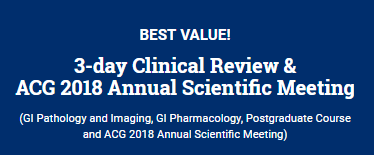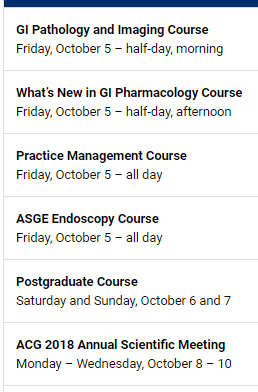ACG 2018: A Colonoscopy-Centric Agenda
by Larissa Biggers, on September 28, 2018
A mainstay U.S. gastroenterology event is set to take place October 5 through 10 in Philadelphia, PA: the ACG Annual Scientific Meeting & Postgraduate Course. The agenda is jam-packed with worthwhile lectures, poster presentations, hands-on workshops, plus an exhibition hall full hundreds of vendors. The choices can be overwhelming, ranging from a roundtable discussion on how to get published to a lunch session on the endoscopic treatment of patients with pancreatobiliary cancers.
For those interested in educational and networking opportunities specific to colonoscopy and colorectal cancer (CRC), the sample agenda below should come in handy.
ACG 2018 Registrations Options
Basic Paths
ACG offers three basic registration paths.
Option 1: The 3-day Clinical Review, which includes:
- The GI Pathology and Imaging course (first half of the day Friday, Oct. 5)
- The GI Pharmacology course (second half of the day Friday)
- the Postgraduate Course sessions (Saturday and Sunday, Oct. 6 and 7)

Option 2: The Postgraduate Course sessions and the Annual Scientific Meeting sessions (Monday through Wednesday Oct. 8-10)
 Option 3: the “Best Value” package, which includes everything in Options 1 and 2 (sessions begin Friday and end Wednesday, Oct. 5-10)
Option 3: the “Best Value” package, which includes everything in Options 1 and 2 (sessions begin Friday and end Wednesday, Oct. 5-10)
Other Options
Alternatively (or additionally), you can choose à la carte offerings. For instance, you can register for Option 2 then add the Practice Management course on Friday. Or maybe you only want to take the Practice Management course, and nothing else. That’s a possibility too.

Concentrating on the Colon
For those who want to attend sessions that focus on colonoscopy and CRC detection / prevention, a sample agenda organized by day is laid out below. For those interested in other topics, check out the Build Your Itinerary tool; it allows you to browse and search by title, date, course, and more.
FRIDAY
PATH 1: ASGE Endoscopy Course (part of the Clinical Review, available via Option 1 above or à la carte) includes worthwhile sessions:
Colonoscopy Pearls
- Large Colon Polyps: EMR, ESD, or Surgery? (11:10 am)
- FIT vs. Colonoscopy: Does It Matter? (11:30 am)
- Quality Metrics in Colonoscopy: Do They Really Measure Quality? (11:50 am)
- Panel Discussion Q & A (12:10 pm)
Potpourri
- Ergonomics for the Endoscopist (3:10-3:30 pm)
PATH 2: Another possibility on Friday is to attend an 11:15-12:20 session that is part of the GI Pathology and Imaging Course (available à la carte): Polyps, Tumors, IBD and More: Pathology and Imaging of the Colon and Rectum - Drs. Robert D. Odze & David J. Vining, Twitter: @VisionSR. (Participants evaluate findings of radiologic exams; identify pathology findings through examination of photomicrographs; and correlate typical radiology and pathology findings with endoscopic images.)
PATH 3: A third option is to attend a Friday session from 10:50-11:10 am; it is included in Practice Management course (available à la carte): Incorporating Efficiency and Best Practices in the Endoscopy Center - Dr. Jay N. Yepuri, Twitter: @DFW_GI_Doc (presents strategies for improving efficiency and optimizing work flow in the endoscopy center).

SATURDAY
Attend a 12:20 lunch session (requires preregistration and an additional fee) on a ubiquitous problem: Tough Colons and Tough Polyps: Tips and Tricks - Dr. Tonya Kaltenbach (covers techniques for managing difficult colonoscopies and polypectomies).
SUNDAY
Sunday includes numerous colonoscopy-focused Postgraduate Course sessions.
Session 2B: Colorectal Cancer Prevention (10:00 am-12:00 pm)
- Colorectal Cancer Prevention in 2018 - Dr. Jason A. Dominitz (an overview of the current status of CRC prevention in the U.S., including screening options and strategies to improve participation)
- Personalized CRC Screening and Surveillance in the Average-Risk Patient - Douglas J. Robertson, Twitter - @DougRobertsonMD (presents methods for identifying the best CRC screening test based on personal demographic and clinical features, and when to start and stop screening)
- Recognition and Management of the Patient at Increased CRC Risk - Dr. Aasma Shaukat, Twitter: @AasmaShaukatMD (covers ways to identify patients at increased CRC risk due to family history and genetic causes, and how to implement appropriate surveillance)
- Optimal Colonoscopy Technique and Polypectomy - Dr. Douglas K Rex (discusses the elements of high-quality colonoscopy, as well as polypectomy strategies based on polyp characteristics)
- Colonoscopy Quality: Measures and Systems - Dr. Irving M. Pike (covers colonoscopy quality standards and requirements and how to apply them)
- Panel Q & A
From 12:20 until 1:30, there is a session on bowel prep: Bowel Preparation Strategies: Routine to Challenging - Dr. Brennan M. Spiegel, Twitter: @BrennanSpiegel, which covers current agents and strategies to optimize bowel preparation quality. Like all lunch sessions, preregistration and an extra fee are required.
Recommended Sunday afternoon sessions are all part of Symposium D: Endoscopy, which runs from 1:45 until 3:00.
- Sedation: Medical and Regulatory Update - Dr. John J. Vargo, Twitter: @JohnVargoMD, (covers the medical and regulatory status of sedation for endoscopy in the U.S.)
- Prevention of Post-Procedure Bleeding - Dr. Heiko Pohl, (focuses on peri-endoscopic management of antithrombotic agents, and endoscopic interventions to mitigate the risk of post-procedure bleeding)
- Taking Care of the Endoscopist - Dr. Amandeep K. Shergill (discusses ergonomic standards for the modern endoscopy unit and strategies to prevent burnout)
- Panel Q & A
MONDAY
From 11:30 am until 12:45, Symposium 1B: Update in CRC Screening covers a range of topics related to colonoscopy.
- CRC Screening Outside the ASC: Non-Invasive Testing performance - Dr. Douglas J. Robertson (explores characteristics of stool and serum-based testing, as well as implications of a positive test and a normal colonoscopy)
- The Cutting Edge of Serrated Polyps - Dr. Joseph C. Anderson (focuses on the biology, diagnosis, and classification of serrated polyps, plus optimal detection, resection, and surveillance)
- Thinking Big About Small Lesions - Dr. Thomas F. Imperiale (describes the management of small adenomas and new concepts such as optical diagnosis and resect and discard)
TUESDAY
Pay the extra fee for an optional breakfast session; Breakfast E: Quality and Technique in Colonoscopy: Doing It Better (6:45 am) promises a lot of bang for the buck. It is divided into three parts:
- Pre-Procedural Quality: Getting Them In and Getting Them Clean -Dr. Jason B. Samarasena (looks at interventions [e.g., navigators and apps] to improve colonoscopy preparation quality and patient tolerance and to reduce procedure cancellation)
- Intra-Procedural Quality: Technology, Techniques, and Tips to Improve Effectiveness - Dr. Seth A. Gross (describes current tools and techniques [e.g., water techniques and computer analysis] to improve quality during a colonoscopy)
- Post-Procedural Quality: How Did We Do and Can We Do Better? - Dr. Irving M. Pike (summarizes quality metrics such as ADR, adverse event tracking, and more, and other possible interventions to increase quality)

WEDNESDAY
The Annual Scientific David Y. Graham Lecture (10:20-10:50 am), Management of Patients With Colorectal Polyps: A Personalized Approach Based on Etiology - Dr. Carol A. Burke, Twitter: @burkegastrodoc, describes the implications of lifestyle, genetics, and polyp characteristics on the management of patients with colorectal polyps.
Hands-On Workshops
Beginning on Saturday at 3:45, the conference offers various Hands-On Endoscopy Workshops. For example, from 3:45 until 5:00 pm on Saturday, there is a session on EMR/Polypectomy. Check out the conference website for a specific schedule. You must preregister at the conference for the workshops because space is limited.
ACG Poster Sessions
If you aren't overwhelmed by choices already, the 2,641 poster session choices might push you in that direction. You could easily spend the entire conference perusing scientific posters. Check out this colonoscopy-focused list to narrow down your options. Different sets of posters are displayed each day, and authors are present in the exhibit hall at specific times:
- Sunday, Oct. 7 (authors present 5:15-6:30 pm / viewing time 3:30-7:00 pm)
- Monday, Oct. 8 (authors present 1:00-2:15 pm / viewing time 10:30 am-4:15 pm)
- Tuesday, Oct. 9 (authors present 1:00-2:15 pm / viewing time 10:30 am-4:15 pm)
ACG 2018 includes much more than is listed here, but hopefully this sample agenda will make the planning process less daunting. Stay tuned for next week's ColoWrap blog, which will cover the conference app--and more.


